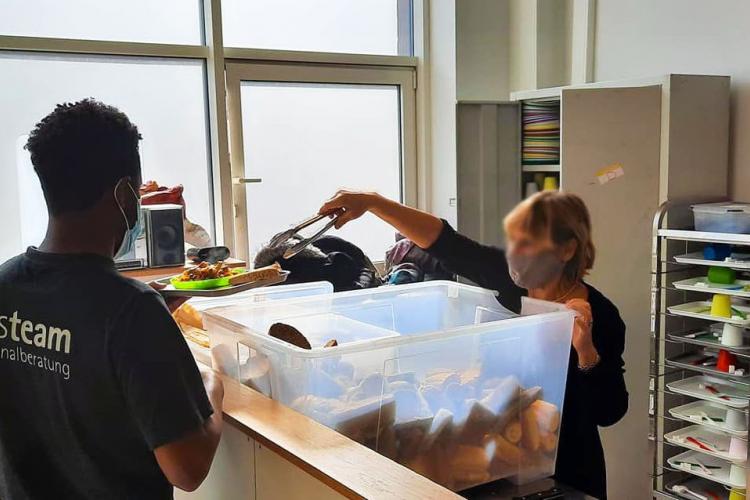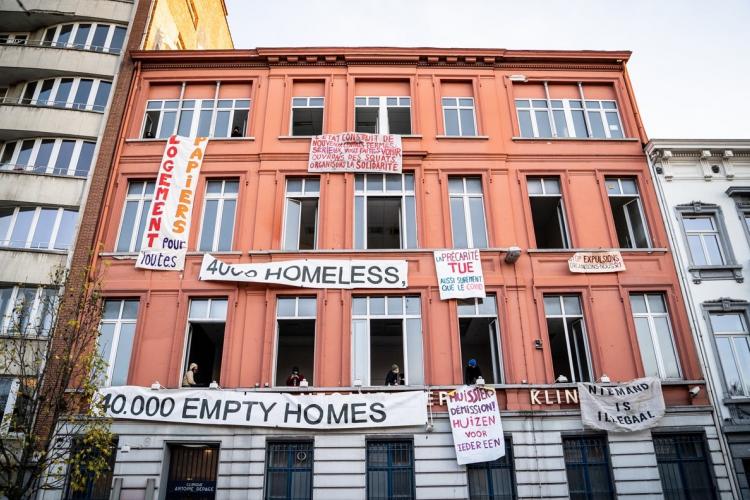From Civic to Autonomous Solidarity: How Grassroots Initiatives in Brussels Reorganised Accommodation for Migrants in Transit During the Covid-19 Pandemic
Posted:
Time to read:
Guest post by Soline Ballet. Soline is a PhD candidate at the Department of Social Work and Social Pedagogy at the University of Ghent where they conduct ethnographic research on support practices with/for illegalised migrants in Belgium. In this blog, the author discusses how different grassroots initiatives in Brussels started, adapted and increased their practices in providing accommodation for illegalised migrants in transit during the Covid-19 pandemic. This is the sixth post in Border Criminologies themed series on'Everyday Violence and Resistance in Europe’s ‘Migration Management’ During the Covid-19 Pandemic', organised by Marta Welander and Dr Susanne Jaspars.
During the Covid-19 pandemic, the hostile environment in Brussels for illegalised migrants in transit continued. As a result, various grassroots initiatives diversified and intensified their support. On the one hand, an existing citizens’ initiative, like the Citizen Platform for the Support of Refugees, increased collaboration with local authorities and local actors. On the other hand, a different type of grassroots actors, such as squatting collectives, emerged and gained importance by occupying buildings all around Brussels. These accommodation practices shifted the types of interpersonal relations established between citizens/volunteers and migrants. In this blog post, I argue that the Covid-19 pandemic was an ambivalent political momentum which brought about a paradox: grassroots initiatives adjusted and demonstrated resilience in providing housing, while also becoming implicated in a pandemic governance mechanism. This provides a new perspective on how in times of crisis grassroots actors’ support can be situated between humanitarianism and political action.

The Belgian state looks away: grassroots initiatives take over
“In the beginning of the lockdown I stayed outside; near the canal for a few days, then in and around the Maximilian Park. The police came every day. We could not stay there. A group from the Citizen Platform came and registered our names. They took us by car to the first hotel they opened: we were the first group to arrive.” Mohammed, like many other illegalised migrants, found himself on the streets of Brussels in the beginning of the Covid-19 pandemic. Illegalised migrants in transit to the UK have been facing repression such as police violence, detention and deportation, as well as ‘violent inaction’ (see the work of Davies, Isakjee and Dhesi). Violent inaction points at how EU states use the denial of provision of basic services as a strategy to coerce migrants into onward mobility. In the case of Belgium, the state has denied these migrants shelter, and medical and material support. During the Covid-19 lockdown, the mobility and livelihood of illegalised migrants was rendered even more difficult. As a response, a well-established citizens’ initiative called the Citizen Platform for the Support of Refugees formed new alliances with the Brussels Region and Brussels’ municipalities, as well as hotel owners to transform hotels into temporary shelters for illegalised migrants.
Accommodation in hotels: The Citizen Platform and local actors
Following discussions and intense lobbying with the respective municipality and the Brussels region, the first hotel opened in the heart of Brussels in mid-March, 2020 (see this article on the Brussels Times). The Citizen Platform coordinated and managed the accommodation in the hotel, together with the hotel owner. Three other hotels opened in the following months, spread out across different municipalities. Thanks to the subvention of the Brussels Region, the Citizen Platform rented the rooms at a minimal price, whilst continued to pay the wages of the hotel staff. However, in this collaboration with local authorities there were apparent tensions. The shift in accommodation practices enhanced the transformation of civic solidarity (see the work of Agustin and Jørgensen) towards institutionalisation, thereby risking to depoliticize the issue. At the same time, the pandemic also urged the Brussels region and Brussels’ municipalities to increase cooperation with the Citizen Platform and to develop a more welcoming city for illegalised migrants (see for example Hombert).
Consequently, the emergency rhetoric and the pandemic governance had implications on the relations between migrants and volunteers within the hotel. Often, grassroots migrant solidarity initiatives forge more personal relations than those solely based on humanitarian care, thereby contending the reproduction of power imbalances. Nevertheless, the pandemic also rendered it difficult to construct such personal relationships in the hotels the Citizen Platform managed. Migrants were often distanced away from volunteers, due to the Covid-19 measures. Support and care were reduced to fulfilling basic needs. While the Citizen Platform maintained a discourse of solidarity, the daily reality in the hotels curtailed the formation of fully personal and reciprocal relationships between volunteers and migrants.

Squatting to accommodate illegalised migrants in transit
The partial reconfiguration of the local political environment during the Covid-19 pandemic gave an impetus for urban movements to occupy buildings in Brussels. Squatting is a criminal activity, barred with immediate eviction and penal sanctions. However, from March 2020 to April 2021, a moratorium was constituted by the Brussels government to temporarily stop evictions. One of the squats which opened was Tilt, a former living complex, occupied and supported by various urban movements. Since the lockdown in March 2020, about twenty illegalized migrants in transit were living there. While the volunteer support group responded with direct action to raise awareness for the precarious situation faced by illegalised migrants, they also tried to strengthen their activism in the wider housing struggle through the occupation of the space.
Whereas literature (see for example the article of Raimondi) on these forms of autonomous solidarity and living spaces conceive these as spaces of self-management and radical autonomy in clear opposition to the local government, a squat such as Tilt actually negotiated with the municipality, the private owner and the police in order to preserve the occupation. In this sense, the emergency of the pandemic and the respective moratorium on evictions produced an environment where local authorities and private owners were more open to negotiate with squatters. Nevertheless, in reality, such discussions were always conditional on the municipalities’ discretionary power. Squatting remains a criminalised activity, and a temporary occupation depends on the willingness of municipalities and private owners to tolerate it.
The Covid-19 pandemic and the pandemic governance challenges the types of relations possible between volunteers/activists and migrants living in squats. The urgency to act and accommodate illegalised migrants while merging emergency solutions with activist methods can endanger potential solidarities between activists and migrants. In Tilt for example, the volunteer support group were not familiar with the lived experiences of migrants, yet they tried to install particular horizontal ways of organising. Subsequently, the insensibility of activists towards the struggles and challenges faced by the migrants, risked overshadowing their voices.
Grassroots resistance during a pandemic
In conclusion, both grassroots initiatives altered their practices to provide accommodation for illegalised migrants during the Covid-19 pandemic. While the Citizen Platform increased collaboration with local actors, more contentious actors such as squatting movements negotiated their own forms of accommodation. This shows how grassroots actors in their everyday resistance to violent migration regimes under a crisis paradigm, whilst being legitimised, also run the risk of reproducing and being co-opted by that same paradigm. In other words, the Covid-19 pandemic generated political openings for negotiations, partially because there was a sanitary pressure to get people off the streets. However, this process also influenced the type of relations between volunteers and migrants in both grassroots initiatives.
Any comments about this post? Get in touch with us! Send us an email, or post a comment here or on Facebook. You can also tweet us.
__________
How to cite this blog post (Harvard style)
Ballet, S. (2022) From Civic to Autonomous Solidarity: How Grassroots Initiatives in Brussels Reorganised Accommodation for Migrants in Transit During the Covid-19 Pandemic. Available at: https://www.law.ox.ac.uk/research-subject-groups/centre-criminology/centreborder-criminologies/blog/2022/03/civic-autonomous [date]
Share:








